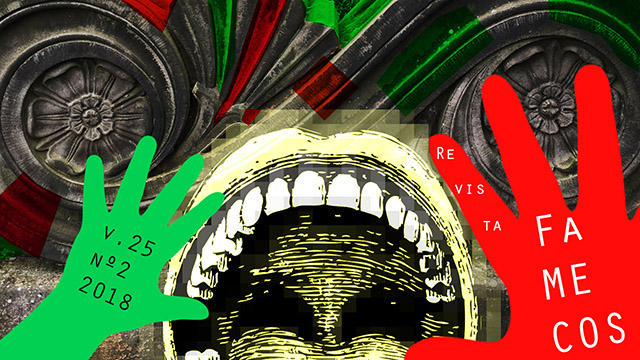Exu, the androgynous canibal: approximations between mythology and anthropophagous brazilian imaginary to think otherness
DOI:
https://doi.org/10.15448/1980-3729.2018.2.27839Keywords:
Imaginary, Brazilian culture, AnthropophagyAbstract
This article proposes to explore the myth of Exu and the Brazilian anthropophagous imaginary in its indigenous conceptions in order to extract an epistemological proposal for the communication that starts from an Afro - Brazilian cannibal metaphysics. After studying the myth of "Exu eats everything" and the indigenous interpretation of the phenomenon of anthropophagy, we re-read the Modernist Anthropophagic Manifesto and, by approximation, we update it in Afro-Brazilian mythology. In approaching this reality through the bias of myth and imaginary, we propose to overcome the barriers of the western representations around the anthropophagy and to contribute to an understanding of this notion as of a digestive path that allows to be constructed through the other. In this way, we conclude that the myth of Exu, as androgynous cannibal, can allow to express the bases of a communicational episteme, Brazilian and contemporary.
Downloads
References
ANDRADE, Oswald de. Manifesto antropófago. In: TELES, G. M. Vanguarda européia e modernismo brasileiro: apresentação e crítica dos principais manifestos vanguardistas. Petrópolis: Vozes; Brasília: INL, 1976. Disponível em: http://www.ufrgs.br/cdrom/oandrade/oandrade.pdf. Acesso em: 25 jun. 2017.
BAITELLO Jr, N. A era da iconofagia. Ensaio de comunicação e cultura. São Paulo: Hacker editores, 2005.
COMO era gostoso o meu francês. Direção: Nelson Pereira dos Santos, Roteiro: Nelson Pereira dos Santos, Humberto Mauro, Elenco: Ana Maria Magalhães, Arduíno Colassanti, Eduardo Imbassahy Filho e José Kléber. Produção: Condor Filmes;
Produções Cinematográficas L. C. Barreto Ltda. Nova Iorque: 1973.
DELEUZE, G. GUATARRI, F. Mil platôs. Capitalismo e esquizofrenia. São Paulo: Editora 34, 1995.
DRAVET, F. Corpo, linguagem e real: o sopro de Exu Bará e seu lugar na comunicação, Ilha do Desterro v. 68, n. 3, p. 15-25, Florianópolis, set./dez. 2015.
DRAVET e outros. Pombagira. Encantamentos e abjeções. Brasília: Casa das Musas, 2016.
FERNANDES, F. A função social da guerra na sociedade Tupinambá. São Paulo: Pioneira/Edusp, 1970.
FERRAZ, M. C. F. Ruminações. Cultura letrada e dispersão hiperconectada. Rio de Janeiro: Garamond, 2015.
FOUCAULT, M. As palavras e as coisas. Uma arqueologia das ciências humanas. São Paulo: Martins Fontes, 2011.
FREUD, S. O mal-estar na civilização. São Paulo: Penguin e Companhia das Letras, 2011.
LEVI-STRAUSS, C. Postface, L’Homme, Paris, n. 154-155, p. 713-720, abr. set. 2000. Disponível em: http://lhomme.revues.org/57 Acesso em: 31 jan. 2017.
______, C. Race et histoire. Paris : Gallimard, 2007.
MAFFESOLI, M. O tempo retorna. Formas elementares da pós-modernidade. Rio de Janeiro: Forense Universitária, 2012.
NICOLESCU, B. Contradição, lógica do terceiro incluído e níveis de realidade, tradução de conferência proferida em 2009. Disponível em: www.cetrans.com.br. Acesso em: 20 jan. 2017.
PALAVRA (en)cantada. Direção e Roteiro: Helena Solberg. Produção: David Meyer. Brasil, Rio de Janeiro: Biscoito fino, 2008. 86 min.
PRANDI, R. Mitologia dos orixás. São Paulo: Companhia das Letras, 2001.
SANTOS, B. S. e MENESES, M. P. Epistemologias do Sul. Coimbra: Almedina, 2009.
SANTOS, J. E. e SANTOS, D. M. (Mestre Didi Asipa). Èxú. Salvador: Corrupio, 2014.
SLOTERDIJK, P. Crítica da razão cínica. São Paulo: Estação Liberdade, 2012.
VIVEIROS DE CASTRO, E. Metafísicas canibais. São Paulo: Cosac Naify, 2015.
Downloads
Published
How to Cite
Issue
Section
License
Copyright
The submission of originals to Revista Famecos implies the transfer by the authors of the right for publication. Authors retain copyright and grant the journal right of first publication. If the authors wish to include the same data into another publication, they must cite Revista Famecos as the site of original publication.
Creative Commons License
Except where otherwise specified, material published in this journal is licensed under a Creative Commons Attribution 4.0 International license, which allows unrestricted use, distribution and reproduction in any medium, provided the original publication is correctly cited.






